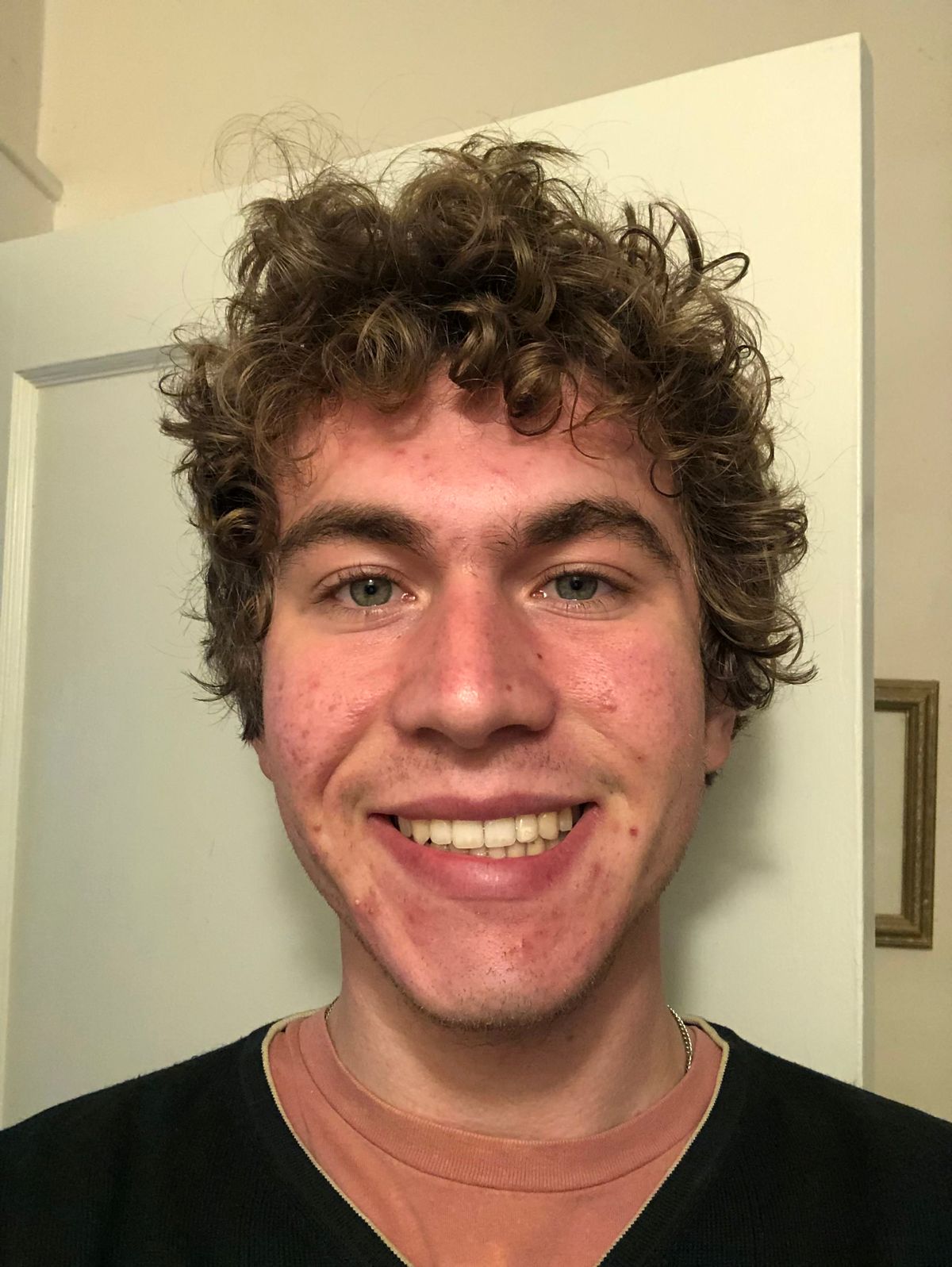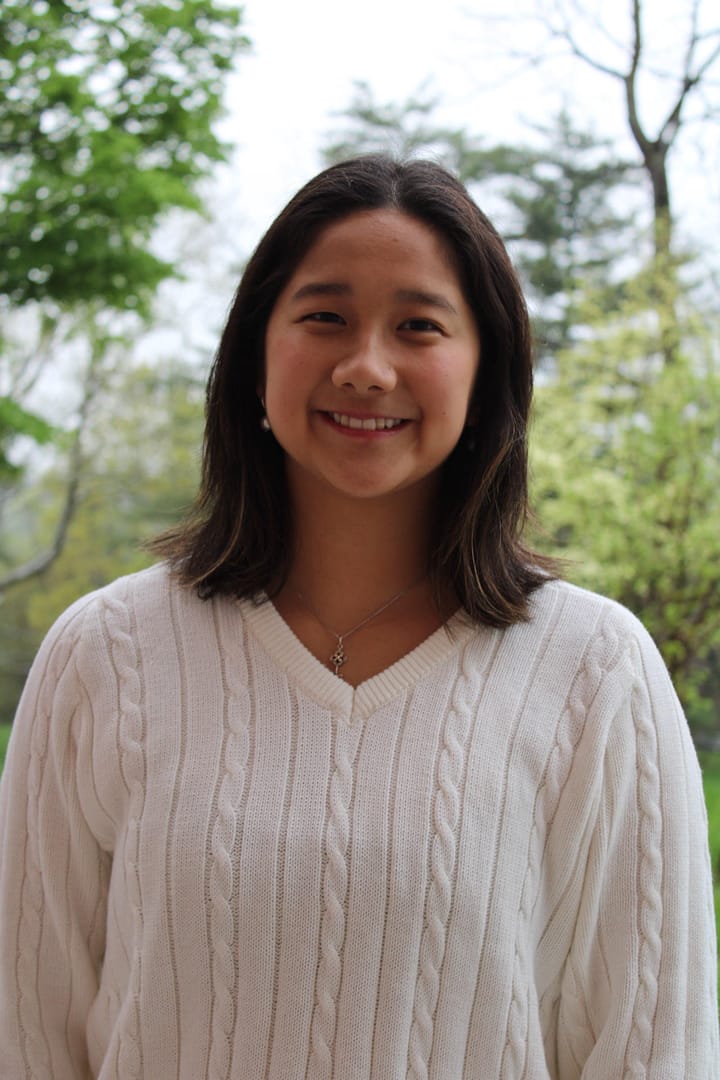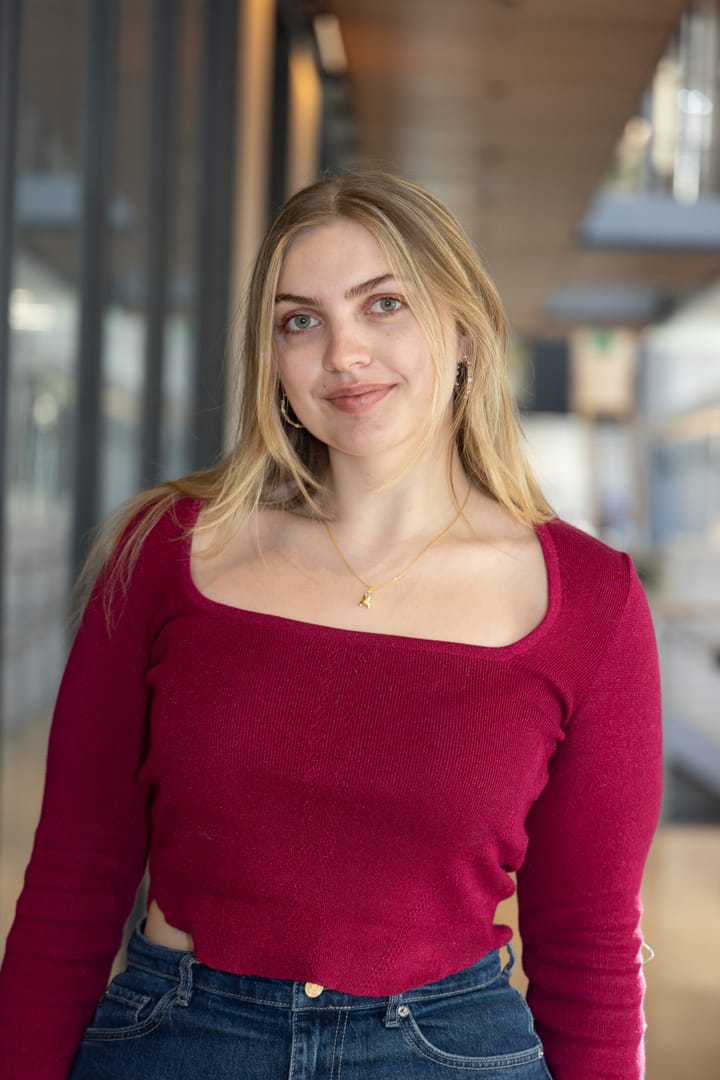Thoughts on Theses: Mathew Mueller ’24
Mathew Mueller ’24 is a senior majoring in music. His performance composition thesis is a jazz concert, featuring arranged pieces with improvisational elements.

Q: My first question is pretty basic. Can you tell me a little bit about the premise of your thesis? What’s it about?
A: It’s a performance composition thesis, so the final project is a concert. It will be jazz. There will be between one and three different bands, or instrumentations. I’m a pianist, so you’ll always have piano in it. And I’m composing all the music for it — slash arranging.
Q: That sounds awesome. And your thesis will be a little bit different from other performance theses because a lot of it involves improvisation, right?
A: Definitely. What’s really common for jazz musicians is to play from this set of old American show tunes from the [1920s]. Jazz musicians have this tradition of picking melodies from these show tunes and playing them on their instruments without words. Originally, the song said words and then a small group — with a pianist, drummer and bassist — do a kind of imitation. And so when jazz musicians play these tunes, they play the melody, but then they play like 10 more minutes of song, which is just every person in the band taking a solo … It will kind of be like a conversation. The whole time, the band is accompanying the soloist who is improvising over a set of chord changes. The chord changes come from the original song, but the band is also improvising what grooves they play and how they play the chords So yeah, there's different levels of improvisation.
Q: Since the final product will be somewhat improvised, can you shed some light on what exactly you are arranging?
A: It’s basically like a sketch. The person playing the melody reads the notes that are written, but then the bassist and the pianist, whoever is accompanying, read the notes at the top and that tells them what chords to play. And then the drummer doesn’t really play any notes, but just reads how many measures there are so they know the contour of the song. Once I give [the music] to them, they can do a ton of stuff with it. I do not have a say over what happens in the final concert. The musicians can do what they want; they make it grow and change. So it’s out of my control.
Q: Who are the musicians that are playing? Are they Amherst students?
A: One Amherst student, one UMass student, [and] a professional drummer. Maybe another UMass student, maybe another Amherst student.
Q: Can you tell me a little bit about your path through the music major, as well as your experience with music before coming to Amherst?
A: Yeah, I have been a musician since I was a kid. I took classical piano lessons when I was six. I think I did that for like 10 years. I took [classical] trumpet lessons for 10 years at the same time … There’s a set of activities that kids do, like high school band, orchestra, and outside-of-school orchestras. And I did all of those things, and then I started doing jazz in middle school. Since then, I’d been mainly playing classical, but I was also doing jazz. Once I got to Amherst, jazz piano became my main instrument. I’ve been in the jazz combo program all four years here, and I’ve taken lessons for four years. I go to jazz jam sessions at the Drake. They’re every other Tuesday. Sometimes I go to Hartford for jam sessions because there’s a really good scene there, too. I’ve also co-lead a Cuban ensemble [for the past two years] and we play salsa. That came out of a student initiative. It was me and Daniel [Flores Garcia '24], my friend. And we just really like salsa; it brings such a smile to us and lots of other people too. And we thought: “Why isn’t this at Amherst?” We did an independent study where we learned how to do basic grooves and then tried to play a couple songs. We moved past that the next semester and just made it a band as a part of the Amherst College’s performance program. Now we’re in our third semester of that. It’s been really hard to teach ourselves this music because it’s actually very complicated and we’re not surrounded by it constantly. It's honestly been my favorite challenge, as an Amherst student, trying to put together this salsa band.
Q: I haven’t seen this combo, but now I totally want to. Where do you guys play?
A: We have barely played, but we will play this semester at least three times. We perform at recitals, but we will also play at least three times outside of departmental stuff. So, like, Zü parties, we play at Zü parties.
Q: When and how did you decide to write a performance thesis? What made you land on this particular topic?
A: Honestly, it was a decision, but I really didn’t feel like it was. Part of what I do is play at concerts. Because my thesis is a concert, it was just obvious. I felt like I had to do a thesis. As soon as I decided to be a music major I realized that I would want to do a thesis. I became a music major and I am a musician because I want to do the type of work that is a thesis, which is spending a lot of time composing and trying to structure a concert and make it an experience for people. And hopefully make it something that is impactful in some way. Even if it’s not necessarily bringing you to tears, but does something for you that’s kind of fun.
Q: I have a two-pronged question to ask you: first, what are you hoping to get out of the process of writing this thesis? And secondly, what do you hope other people will get out of it?
A: Well, for the first one, I’m hoping to engage myself and maintain some level of focus and attention on a single project for longer than I ever have before. I’m hoping that by doing that, I will really become better at writing and communicating ideas and creating ideas. I play concerts all the time, but mostly without any preparation. And so the different thing about this concert is that instead of just showing up and playing, I’m spending a year preparing for it. What I’m hoping to get out of that is starting with all the ideas that I already have, if I just improvise, but then writing them down, looking at them, and saying, “Okay, do I want to say all of that or do I want to change it a little?” And so doing an editing process with my musical ideas. Yeah, I guess I want to get better at editing.

Q: And for the people watching?
A: I hope the audience just enjoys it. I hope that it feels like something. Because when I perform, it’s gonna be fun. Hopefully. Hopefully it won’t feel like academic work.
Q: Is there anyone in the Amherst musical community who has been helping you through this process?
A: Yeah, [Professor of Music] Jason Robinson. He’s a music professor, a jazz musician, composer, scholar, and he’s my advisor. A year ago, we did an independent study where I showed up once a week, and we would just play together, like a saxophone and piano duo. It was kind of to build my confidence in playing because he is a pro. And I am but a mere student. It’s really the best way to learn — play[ing] with people who know a lot more and have a lot more experience than you and also whose music you enjoy.
Q: Are there any jazz musicians or musicians in general who you admire or look up to? Are they influencing your thesis in any way?
A: Tons. My thesis is totally inspired. It’s like 100 different musicians coming together. I think Thelonius Monk is one big inspiration. Esperanza Spalding is a second one.
Q: Next question: can you describe a typical day in the life working on your thesis?
A: Yeah, so I have not been working on my thesis that much. I’m a little anxious about that, but I’m so committed to starting. I actually just made an arrangement of a song today. So for example, today I’ve been playing a song that’s called “Days of Wine and Roses.” It’s an old jazz tune. But then I thought we need songs for the Cuban group next semester to rehearse. So I should make a version of this that we can play, so I went to the piano and worked out a version of this jazz tune for the Cuban group. [After] 15 minutes, 10 minutes, maybe five minutes, I went to my laptop for like two hours. To actually write it onto my notations, so that I can print it and then hand it out to the musicians so they can play it, took longer. And that’s pretty normal. I would say that’s the bulk of the work most of the time. Most of the time, I think of a song, maybe I wake up at 2 a.m. … Right before I’m going to bed I think of a melody, and I record it. I sing it to my voice memos. And that’s the song right there. I just sang it, and all the information is there. It was a moment of inspiration and within a minute the song was there, but then the work of transcribing that, writing it out, and actually, saying “Wait, what was I trying to say there?” … That takes sometimes four hours, depending on how complicated the ideas are to write out on my laptop so that I can give it to other musicians.
Q: Your passion for music is amazing. What other hobbies or interests do you have?
A: I like playing tennis. I like cooking. I like to run.
Q: Do you think that your non-musical hobbies or other parts of your life have informed your musical thesis in any way?
A: Oh yeah, definitely. I mean, everything I do ends up [in my music] in some way that I don't understand. Like the inspiration for an idea. I just went on a month-long trip. Coming back, my brain was kind of frazzled. But I’ve been generating a lot of new ideas on the piano just because I went on a trip. And the same thing if I just go out and have a good day; I come back to the piano, I play that. Everything has an impact.
Q: Do you have any advice to give students who are thinking about writing theses? Any wise words that you want to share?
A: If you’re doing a music thesis — specifically, if you’re a jazz musician doing a performance and composition thesis — … and I’m just saying what my advisors told me … but don’t treat it like a gig. Because as a jazz musician, you play concerts all the time and you just wing them. So my impulse has been to treat my thesis like that and to think that I could do a really good concert without any prep work. My recommendation is against that impulse. This is the first time I’ve ever spent serious time editing my musical ideas and sitting with them. It’s so valuable because I write out my ideas, and in doing so, clarify how I’m thinking and it affects how I end up playing afterward. It’s such a mess in my mind, but the more I write, the more ordered things get. And the more they come out with the flow kind of comfortably. They don’t all get jammed up. Yeah, so writing, writing is great. Writing is a really good thing.
Q: With graduation right around the corner (well, maybe not right around the corner, but approaching in the near future … ), I’m interested to hear about your post-grad plans. Is there anything that you are excited about pursuing or particularly looking forward to?
A: Yes! I’m excited to hopefully teach English in Madrid. I’m doing that in part to learn Spanish so that I can live in Cuba afterward to learn to play music there. But in Madrid, I’m just looking forward to being in an awesome place and not being a student. Also, the music scene there is super cool. There are jazz musicians and Cuban musicians who I like and I would like to study with, or at least meet.
Q: That’s incredibly exciting. Is there anything that you wish I had asked you or you want to add?
A: Shakes head.
Q: Well, those were all my questions. Your thesis sounds incredible; I wish you the best of luck. I’m very excited to come and watch it for myself.
A: Yes, you’re totally invited. Oh, April 5. I should definitely say that … the concert is on April 5.





Comments ()